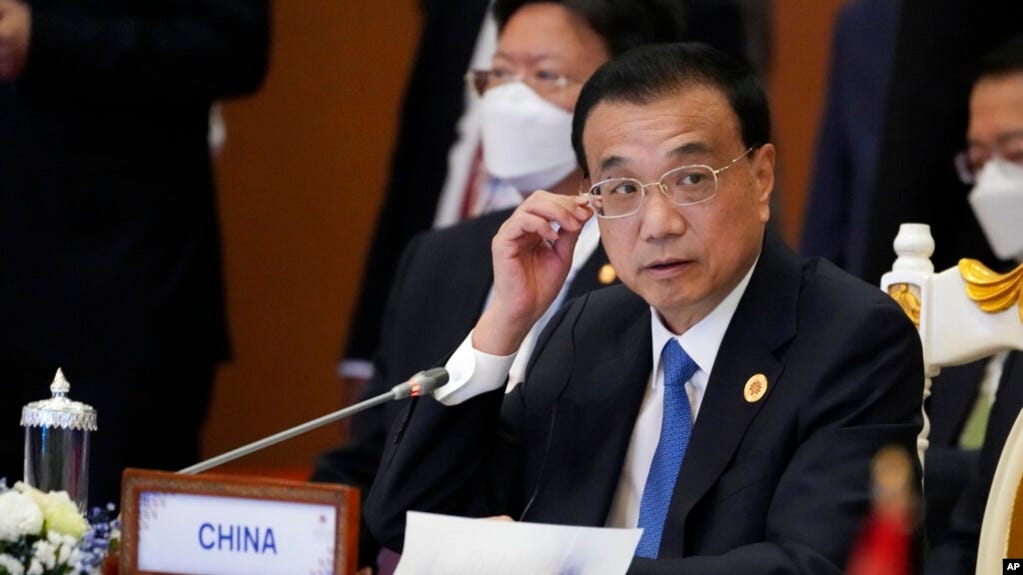China's Premier Li Keqiang Takes Final Bow, Marking Shift in Leadership
Li exited the ruling Communist Party's all-powerful Politburo Standing Committee in October, despite being below retirement age.

China-After a decade in Chinese President Xi Jinping's shadow, Li Keqiang is taking his final bow as the country's premier, marking a shift away from the skilled technocrats who have helped steer the world's second-biggest economy in favor of officials known mainly for their unquestioned loyalty to China's most powerful leader in recent history.
Li exited the ruling Communist Party's all-powerful Politburo Standing Committee in October, despite being below retirement age. His last major task was delivering the state of the nation address to the rubber-stamp parliament on Monday. The report sought to reassure citizens of the resiliency of the Chinese economy but contained little that was new.
Once seen as a potential top leader, Li was increasingly sidelined as Xi accumulated ever-greater powers and elevated the military and security services in aid of the "great rejuvenation of the Chinese nation." Li's lack of visibility sometimes made it difficult to remember he was technically ranked No. 2 in the party.
"In an era where personal loyalty trumps all, the fact that Li wasn't seen purely as a Xi loyalist may end up being 'the main reason why he will be remembered fondly'," said Steve Tsang, director of the China Institute at the London University School of Oriental and African Studies and a longtime observer of Chinese politics.
Li's Background and Career
For most of his career, Li was known as a cautious, capable, and highly intelligent bureaucrat who rose through, and was bound by, a consensus-oriented Communist Party that reflexively stifles dissent. As governor and then party secretary of the densely populated agricultural province of Henan in the 1990s, Li squelched reporting on an AIDS outbreak tied to illegal blood-buying rings that pooled plasma and reinjected it into donors after removing the blood products, allegedly with the collusion of local officials.
Li was an English speaker from a generation of politicians schooled during a time of greater openness to liberal Western ideas. Introduced to politics during the chaotic 1966-76 Cultural Revolution, he made it into prestigious Peking University, where he studied law and economics, on his own merits rather than through political connections.
Among the largely faceless ranks of Chinese bureaucrats, Li managed to show an unusually candid streak. In a U.S. State Department cable released by WikiLeaks, Li is quoted telling diplomats that Chinese economic growth statistics were ''man-made,'' and saying he looked instead to electricity demand, rail cargo traffic, and lending as more accurate indicators.
Li's Authority Shrinks Under Xi
Li, who hailed from humble backgrounds, had been seen as Hu's preferred successor as president. But the need to balance party factions prompted the leadership to choose Xi, the son of a former vice premier and party elder, as the consensus candidate. The two never formed anything like the partnership that characterized Hu's relationship with his premier, Wen Jiabao, or Mao Zedong's with the redoubtable Zhou Enlai, although Li and Xi never openly disagreed over fundamentals.
"Xi is not the first among equals, but rather is way above equal," said Cheng Li, an expert on the Chinese leadership at the Brookings Institute in Washington, D.C. Ultimately, Li was a "team player" who put party unity foremost, he said.
Meanwhile, Li's authority was being gradually shrunk, beginning with a reorganization of offices in 2018. While some may have wished Li had been more "influential or decisive," the ground was crumbling under his feet as Xi shifted more of the powers of the State Council, China's Cabinet, to party institutions, Cheng Li said. That shift to expanded party control is expected to continue at the current congress meeting on an even greater scale.


